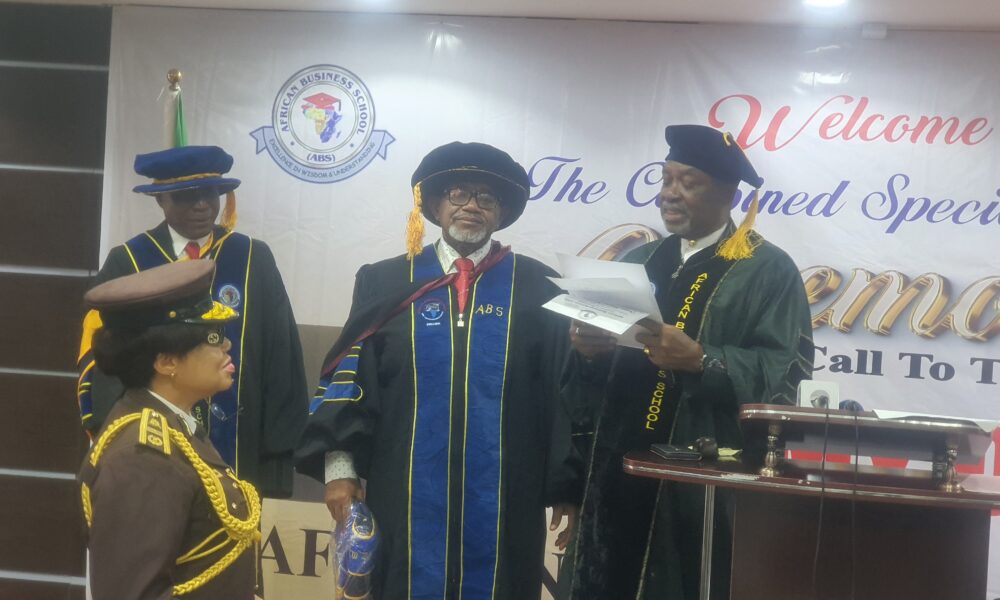**Sets to help Tinubu reset economy
President of the African Business School (ABS), Dr. Goddy Idaminabo, has announced the launch of the Academy of Fellows, a strategic initiative aimed at addressing Africa’s pressing economic and administrative challenges.
He spoke in a keynote address he delivered during combined special Awards Ceremony and call to the Academy of Fellows to celebrate distinguished individuals who have significantly contributed to Africa’s development on Friday.
The President highlighted ABS’s long-standing contribution to leadership development and its commitment to driving sustainable solutions for the continent’s development.
In a significant announcement, Dr. Idaminabo revealed that ABS is transitioning from the “Fellows of the African Business School” to the Academy of Fellows. This shift aims to foster broader collaboration among experts from various disciplines, creating a platform for multidisciplinary solutions to Africa’s challenges.
Recognizing the economic downturn affecting Africa, Dr. Idaminabo emphasized the need for innovative approaches.

The Academy of Fellows, he explained, will bring together experts from diverse fields, including engineering, finance, and administration, to tackle specific challenges. “If Nigeria has a problem in engineering, finance, or administration, we have the experts. Administration, in particular, is the mother of all professions, and it is key to solving many of our problems,” he stated.
Dr. Idaminabo praised ABS’s track record in nurturing high-profile leaders across Africa, particularly in Nigeria.
He noted that many alumni have gone on to serve as permanent secretaries, governors, and heads of parastatals. “The African Business School is the best business school in the whole of Africa. We have developed leaders who are making an impact in governance and administration,” he said.
Dr. Idaminabo also expressed optimism that the Academy would support Nigeria’s leadership in navigating its economic and governance challenges.
“This school now stands ready to help the president and this country. With the Academy of Fellows, we will get it right, and this country will move forward,” he assured.
“The African Business School, known for its leadership programs and professional training, aims to position the Academy of Fellows as a think-tank to drive policy innovation and economic growth across the continent.
“The African Business School is a leading institution focused on developing skilled professionals and leaders across Africa. Its programs emphasize innovation, administration, and leadership, with alumni serving in prominent roles in both the public and private sectors.
On the Academy’ focus on Administration he stressed the importance of administration as the foundation of all professions and a critical factor in addressing Africa’s systemic issues.
He noted that the lack of proper administrative frameworks contributed to inefficiencies, adding that ABS eill fill the gap.
“By aligning its expertise with the country’s needs, ABS aims to assist Nigeria’s leadership in tackling economic and governance challenges. Dr. Idaminabo expressed optimism that these efforts would lead to meaningful progress.
He highlighted the importance of integrity, teamwork, and innovation in achieving the goals. “Our collective responsibility is to rewrite the narrative of Africa, starting with actionable steps that foster growth and development,” he said.
Dr. Idaminabo acknowledged the achievements of the awardees and past fellows, commending their integrity and dedication to their fields. He noted that the event was a platform to celebrate excellence and inspire future generations. “We are here to honor those who have made a meaningful impact on our continent and exemplified the values of honesty and service,” he stated.
The event concluded with a call to action, as Dr. Idaminabo encouraged attendees to collaborate and explore visions for Africa’s sustainable future during the day’s scheduled discussions.




